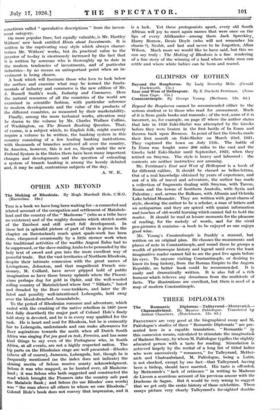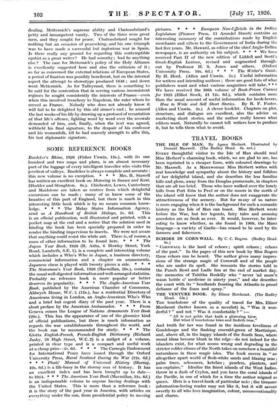THREE DIPLOMATS
The Romantic Diplomat—Talleyrand—Metternicii-- Chateaubriand. By Maurice Paloologue. Translated by Arthur Chambers. (Hutchinson. 12s. 6d. ) FRENCHMEN are very good at the biographical essay and M. Paleologue's studies of three " Romantic Diplomats " are pre- sented here in a capable translation. " Romantic " in this connexion means, calculated to stimulate the imaginatio; of Madame Bovary, by whom M. Paleologue typifies the slightly educated person with a taste for reading. Stimulation is achieved largely by the recital of a long list of titled ladies who were successively " romances," for Talleyrand, Metter- nich and Chateaubriand. M. Paleologue, being a Latin, is not shocked, except by one fact--that Talleyrand, having been a bishop, should have married. His taste is offended, by Metternieh's " lack of reticence " in writing to Madame de Lieven a scurrilous account of his previous amour with the Duchesse de Sagan. But it would be very wrong to suggest that we get only the erotic history of these celebrities. These essays picture very clearly Talleyrand's far-sighted double. dealing, Metternich's supreme ability and Chateaubriand's petty and incompetent vanity. Two of the three were great men, and they sought for peace. Chateaubriand sought for nothing but an occasion of peacocking, and his one triumph was to have made a successful but inglorious war in Spain. Is there really any ground for regarding this contemptible egotist as a great writer? He had sonority ; had he anything else ? The case for Metternich's policy of the Holy Alliance is excellently suggested here and also the criticism of it ; so far as concerned the external relations of European States, a period of fixation was possibly beneficent, but on the internal aspect the attempt to stereotype produced 1848 ; and down went Metternich. As for Talleyrand, there is something to be said for the contention that in serving various inconsistent regimes he sought consistently the interests of France—even when this involved treachery to Napoleon, the ruler whom he served as France. Nobody who does not already know it will fail to be delighted by this old sinner's end ; he amused the last weeks of his life by drawing up a protocol of recantation of that life's offence, fighting word by word over the avowals demanded of him, and, finally, when the text was agreed, withheld his final signature, to the despair of his confessor and his womenfolk, till he had scarcely strength to affix this, his last diplomatic signature.











































 Previous page
Previous page